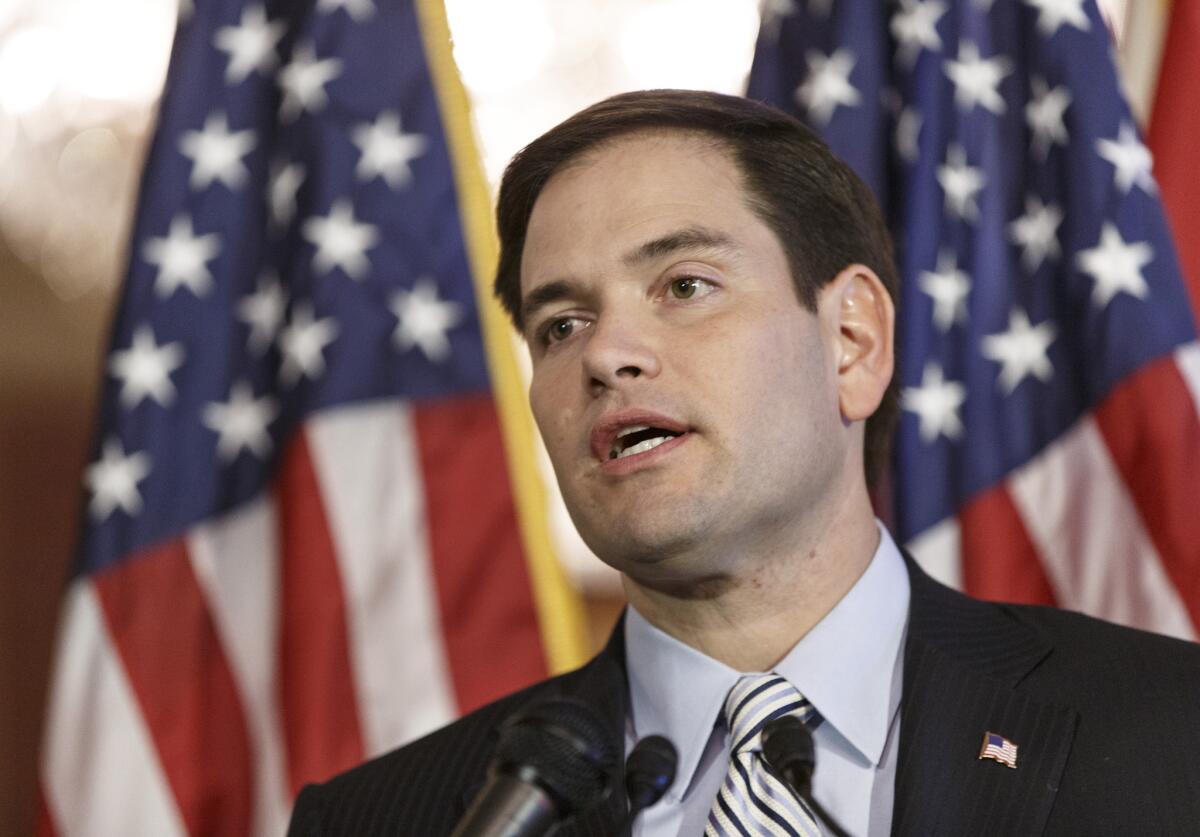The GOP discovers inequality

âPoverty is not some rare disease from which the rest of us are all immune,â a leading American politician said last week. âIt is but the worst strain of a widespread disease otherwise known as economic insecurity. Most families worry about making ends meet.â
That must have been President Obama or some other Democrat, right?
Wrong.
It was Rep. Paul D. Ryan (R-Wis.), Mitt Romneyâs former running mate and the Republicansâ chief budget-cutter on Capitol Hill. Up to now, his most famous statement about the social safety net was that it risked becoming âa hammock that lulls able-bodied people to lives of dependency and complacency.â
Ryan is not the only conservative to have turned his attention to less fortunate Americans in recent weeks. Republicans have suddenly erupted in a flurry of proposals to do more for the working poor and the embattled middle class.
Sen. Marco Rubio (R-Fla.), who may be thinking about a presidential campaign, gave a speech this month proposing federally funded wage subsidies for the working poor. And Sen. Mike Lee (R-Utah), a tea party leader, has proposed increasing the child tax credit to give low-income families a bigger break.
Why the sudden interest in poor people? The GOP seems to have learned something from Romneyâs 2012 presidential campaign: If Republicans sound indifferent to the problems of low-income workers, they will lose support in the broad middle class as well. And with the president keeping economic inequality at the center of his agenda, the heat is on.
Exit polls after the 2012 election showed that voters were deeply unhappy about the economy and evenly divided over which candidate could fix it. But a solid majority voted for President Obama anyway â largely because he won handily among those who wanted a candidate âin touch with people like them.â
In the postelection folklore, Romneyâs candidacy imploded after the emergence of the famous videotape that showed him dismissing the least affluent 47% of the citizenry as shiftless freeloaders.
But that was only half the story, according to GOP pollster and strategist Frank Luntz. He believes Obama actually won the 2012 campaign much earlier â by placing himself on the side of hardworking families who felt they couldnât catch a break in an economy that was funneling rewards to the rich.
âObama began framing the issue this way: that if you work hard and play by the rules, you should have an opportunity to get ahead,â Luntz told me Tuesday.
The stagnation of middle-class incomes and the growing gap between rich and poor arenât by any means partisan issues. Republican voters worry about them as much as Democrats do. But the two parties disagree sharply about solutions, and in 2012, the GOP argument that lower taxes and less federal debt would be enough to solve the economyâs problems didnât carry the day. âYou need to say more than that,â Luntz counseled.
That doesnât mean the GOP will become a party of big government. The proposals coming from âreform conservatives,â as theyâre known, still start from the premise that the federal government is too big and inefficient to manage anti-poverty programs well. But theyâre arguing that the GOP should tackle the problem head-on, and thatâs new.
âThe uncomfortable truth is that there are now a number of other countries with as much or more opportunity than ours,â Rubio said on Jan. 8. âMore people in Canada go on to surpass the income of their parents than in the United States.â
Rubioâs main proposal for addressing the problem embraces an ancient Republican idea: that the federal government should send most of the money it spends on poverty to the states, and let them handle it. But he also proposed replacing the earned income tax credit with a direct subsidy that would go to more workers.
Ryan has proposed that the U.S. consider another approach: a British experiment called Universal Credit, which combines low-income assistance (including, for example, food stamps, welfare and housing subsidies) into a single cash payment. The payment would taper off gradually as workers earned more, avoiding the danger of discouraging people from seeking work.
Neither of those wonky ideas is likely to spark grass-roots enthusiasm in either party. Rubio drew an instant rebuke from some conservatives who objected to his declaration that income inequality is a problem. (Unequal opportunity is a problem, they said, not unequal incomes.)
But the GOP will continue to look for ways to address the issue, if for no other reason than that Obama wonât let it go.
Is common ground possible? âIf we actually have an adult conversation about how to restore economic mobility ⌠I think we can make a difference,â Ryan said last week.
Thatâs optimistic. Thereâs still a vast gulf between the two parties, and Republicans may have trouble convincing voters in the middle that GOP compassion goes far enough: Rubio voted against extending unemployment benefits, for instance, and Ryan voted to cut food stamps.
But the two parties have agreed on a basic premise: that the federal government must do more to help the poor, especially low-income workers, clamber out of poverty. And thatâs progress.
Twitter: @DoyleMcManus
More to Read
A cure for the common opinion
Get thought-provoking perspectives with our weekly newsletter.
You may occasionally receive promotional content from the Los Angeles Times.











